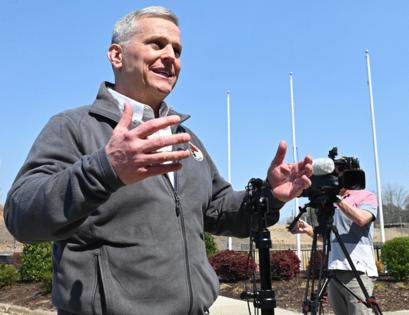North Carolina Gov. Josh Stein vetoes bill allowing private schools to let teachers carry guns
Published in News & Features
RALEIGH, N.C. — Gov. Josh Stein vetoed legislation on Wednesday that would have given private schools the option to allow teachers or school volunteers to carry concealed handguns on campus.
House Bill 193 would have permitted employees or volunteers at private schools to carry firearms or stun guns on school grounds if they received written permission from the school’s board of trustees or administrative director, had a concealed handgun permit, and completed an approved training course.
The bill would have also required schools wanting to allow their employees to carry handguns to adopt “written standard operating procedures” for possessing and carrying weapons on school property and distribute those to parents of students.
Republicans and supporters of gun rights argued the bill would make schools, particularly those located in rural areas, safer by giving them the option to have someone on school grounds who is armed and can deal with a school shooter. Democrats and groups that advocate for stricter gun laws slammed the bill, saying the presence of firearms on campuses would make schools unsafe.
In a statement, Stein said the bill would “make our children less safe” and argued that law enforcement officers and school resource officers who go through extensive training to protect the public should not be substituted by school teachers and volunteers.
“Just as we should not allow guns in the General Assembly, we should keep them out of our schools unless they are in the possession of law enforcement,” the Democratic governor said. “Law enforcement officers receive more than 800 hours of public safety education, including firearms training. On top of that, School Resource Officers receive additional training to know how to respond to crises and how to deescalate conflicts, a requirement I supported when I was Attorney General.”
“We cannot substitute the protection offered by well-trained law enforcement officers by asking teachers and school volunteers to step in and respond to crises while armed,” he said. “Just last year, an employee at a religious school in Goldsboro left a gun in a bathroom that was later found by an elementary school student.”
Stein added in his statement that he supported a provision in the bill to help better protect local elected officials who face threats to their safety. He urged lawmakers to send him “a clean bill with those protections so I can sign it.”
Votes on some other bills Stein has vetoed this year have fallen strictly along party lines, raising the question of whether Republicans will be able to override those vetoes, but HB 193 passed with a few notable Democrats joining the GOP in supporting the bill.
In the Senate, where Republicans control the three-fifths supermajority that is required to override vetoes on their own, three Democrats broke ranks with their party to vote in favor of the bill: Sens. Dan Blue, Gladys Robinson, and Paul Lowe.
When the House first voted on the bill, it passed along party lines with one exception: Republican Rep. Mark Pless broke with the rest of his caucus and voted against the bill.
After the Senate made changes to the bill, however, one House Democrat voted in favor of agreeing with the Senate’s version of the bill and sending it to Stein.
Rep. Shelly Willingham had previously voted against the bill. He told The News & Observer after that vote last month that he changed his mind after hearing from private schools in his district about the need to have an option for school employees to be armed.
Willingham said that as a retired police officer, he doesn’t personally “necessarily want guns on campus” and knows “what they can do.” Still, he said, he supports giving private schools that may want to have an armed employee on campus the option to do so.
The Rocky Mount Democrat told The N&O in June that if Stein vetoed the bill, he planned to vote to override the veto.
“If I vote for a bill, if I’m voting to support it, and (if) it goes to the governor, and he happens to veto, then when the bill comes back, I’m going to vote to sustain my vote,” Willingham said.
©2025 The Charlotte Observer. Visit at charlotteobserver.com. Distributed by Tribune Content Agency, LLC.







Comments